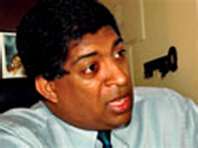Ranil’s political descent
One cannot deny the fact that Ranil Wickremasinghe had the background to be a leader. His father, Esmond Wickremasinghe was one of the most eminent sons of the country, a close Advisor to many Prime Ministers. His paternal grand father was a brilliant civil servant; his maternal grand father was none other than the media mogul, D R Wijeyewardene and J R Jayewardene was his uncle. Who could boast about a more decorated lineage than that? Brought up in the lap of luxury, nurtured by a family milieu for whom “power” was just
another ornament that embellished the verandahs of post-colonial Ceylon.
Currently the UNP vote bank among the Sinhalese Buddhists is perhaps at its lowest. The CFA agreement initiated by Ranil when he was Prime Minister for a short while in 2001-2004 period, the comments of “Medavachchiya-Kilinochchi and “Ali Mankada-Pamankada” by Ravi Karunanayake in Parliament and other imprudent utterances were exploited to the hilt by the Rajapaksas and the government propagandists during the last Presidential and Parliamentary election campaigns.
Working Committee Meeting
In such a context, Ranil Wickramasinghe committed some missteps. On October 27, 2011, at the Working Committee meeting of the UNP, the Party leader expelled Venerable Meetiyagoda Gunaratne Thero from the post of President of the Eksath Bikshu Peramuna affiliated to the UNP. Although the Peramuna is affiliated to the Party, it is a totally independent organization functioning under democratic rules of the day. Election of its office bearers is not subject to the whims of the Party leadership. What is the sin committed by the Venerable Gunaratane Thero? He openly asked the leader to step down without causing further erosion of the party vote base. Ranil made two monumental blunders: one political and the other technical. 1. He removed a Buddhist monk from an organization of Buddhist monks, and 2. He interfered into an organization of Buddhist monks where he has no political or legal jurisdiction.
Going places
Wickremasinghe went further. He decided to interfere in the organization of the Association of Former UNP Parliamentarians. Just prior to the Working Committee meeting of October 27, this Association issued a critical analysis of the results of Municipal Council Elections recently concluded. It was, among other things, very critical of the Party leadership, and its conduct of affairs. What did Ranil do? He took the law into his own hands and appointed some of his cohorts who are in the working Committee to re-organize the Association. There again he went into a place where he had no jurisdiction.
Ranil not playing Sinhala Buddhist politics
Ranil Wickramasinghe thinks that the UNP’s retention of the Colombo Municipal Council with a drastically reduced majority is a major victory for himself. But the net result of this would be a further distancing of Sinhalese Buddhists from the Party vote base.
October 27, 2011 – a day of reckoning
These acts will take its toll. If it affects only its leader, then it could be tolerated. However, the effects on the Party would be unbearable. In a bid to strengthen his position in the Party, Ranil Wickramasinghe has provided his enemies with more weapons. The criticism and attacks that will be hurled may have their desired results, may be not immediately, but in time to come.
This article was further amended and edited on November 9, 2011
DISCLAIMER
This website is committed to giving space to all shades of opinion and points of view. The opinions expressed by our commentators do not necessarily reflect the opinions or ideology of this website and/or its editor/owner.

